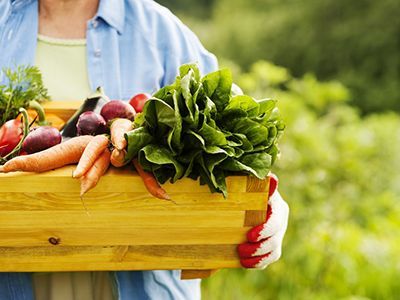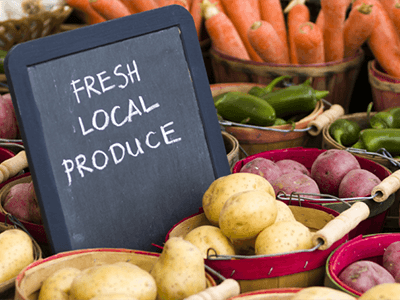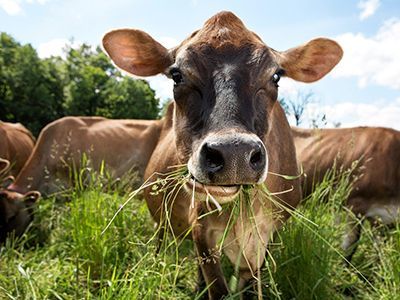Celebrating Earth Day 2022: Investing in the Health of Our Planet
In honor of Earth Day on April 22, 2022, this month’s Healthy Living blog will expand our focus from our own personal health to include ways that we can support the health of our planet. This year’s Earth Day theme is “Invest in Our Planet”, with special attention to supporting a prosperous and sustainable future, so we can restore nature and build a healthy planet for our children and future generations.
There are many ways to get involved in Earth Day – the world’s largest environmental movement – including planting trees or a pollinator garden, joining a clean-up effort, and being a part of conservation, restoration, and biodiversity initiatives. For suggestions and resources, click here.

Since dietary medicine is one of the pillars of Mederi Care® , our focus for this article is healthy eating habits that keep the health of the environment at the forefront. It may not surprise you that healthy eating goes hand in hand with sustainability, and eating a diet with the least possible environmental impact also helps support our health.
Food has both an environmental footprint and ecological footprint. Food production can negatively alter ecosystems and conventionally grown food requires enormous resources to produce. Instead of eating these foods, and buying food products that are transported halfway around the world to reach our homes, we can change our buying habits in such a way that supports both personal and environmental health.
What can I do to eat sustainably?
A sustainable diet is one that minimizes impact on the environment. Eating sustainably also contributes to food security and to current and future generations leading a healthy life. In addition, a sustainable diet supports biodiversity and healthy ecosystems.1 If we consider this our responsibility, it becomes an exercise in self-care and respect for our planet.

Here are some tips to follow:
Eat seasonal foods
Have you ever bitten into a strawberry and discovered the inside was white, not red? That’s probably because it was grown far away, imported from another country, and not in season. Contrast that with a juicy, red strawberry that bursts with flavor, grown locally and in season.
Many fruits and vegetables can be bought throughout the year, but most of the time they are imported products, or they have been preserved in cold storage, during which greenhouse gases are emitted. Consuming seasonal foods means that they are at their optimum maturation point, making them extra tasty and nutritious.2

Consume local products
Consuming local products refers to products that are produced and/or collected in areas near their place of sale, where they are purchased by the consumer. The main advantage of these products is their energy savings and the reduction of greenhouse gases since the product isn’t transported from afar.3
“Buying local” also helps to strengthen local economies and support neighborhood markets, shops, and locally-owned or operated restaurants4. Look for a farmer’s market in your community to support local food production. You’ll not only enjoy the fresh flavors of vegetables, fruits, meats, fish or dairy grown or produced in your region, you’ll benefit from the nutrition and enhanced flavor of fresh foods.

Eat organic whenever possible
Food and agriculture are the main drivers of biodiversity loss, which is why food sustainability is an increasingly important issue. To be considered a sustainable agricultural practice it must enhance biodiversity, protect soil, forests, and water, minimize chemical contamination of people and food, maintain long-term ecosystems, and reduce global warming. Eating an organic diet reduces the impact on the environment caused by the use of synthetic compounds and chemical fertilizers such as pesticides and herbicides, and can also help remineralize soils.5
Consuming organic plant-based foods also makes a positive impact on our health. So too does consuming animal products that are produced from organic practices. For insight into the importance of consuming organic dairy, check out the blog by Mederi Center practitioner Dr. Susan Saccomanno. Also of interest is our founder Donnie Yance’s blog that discusses how toxic farming practices create unhealthy grains that can cause a whole host of health problems, and how the use glyphosate in conventional agriculture has been confirmed to cause many health conditions and diseases as well.

Reduce your meat and fish intake
Reducing the consumption of foods of animal origin is key to fighting climate change. Increase foods of plant origin with good nutritional value, such as legumes, and introduce other plant-based sources of protein such as tofu or fermented soy. Be innovative in the kitchen and try new recipes, like our lemon broiled tempeh!
On your next visit to the grocery store, try filling your shopping cart with more vegetables and fruits than products of animal origin. This doesn’t mean you have to eliminate meat, fish, or dairy, just include them in your food plan in a more moderate way.6,7

Don’t waste food
There are many things we can do to help reduce food waste. For example, prepare a weekly meal plan at home and adjust the portions to reflect what your family actually consumes. Buy only the food that you need so you can avoid having to throw away food that’s gone bad. Another good practice is to give a second chance to foods that are not so aesthetically pleasing, such as fruits and vegetables that might have a little nick or bruise. Try making a vegetable soup or a ratatouille, for example, and remember to check the pantry to prevent food from expiring.8,9
Buy less processed foods
Processed foods, apart from being harmful to our health, are mostly packaged foods that generate more waste and have a multitude of ingredients and additives that contribute to increasing greenhouse gas emissions10. Buying in bulk can help us buy just what we need, as well as reduce the use of plastic. Reusable cloth bags, baskets, and glass containers can also be used at the grocery store to cut back on the use of disposable plastic. Decline the use of paper or plastic bags to bring your groceries home and opt for a reusable shopping bag instead. Lastly, consider bringing your own to-go container the next time you order take-out as a way of reducing single-use plastic or other disposable containers.
We hope this article gives you some creative and thoughtful inspiration on how to eat a more heathy diet that also supports the health of our natural environment.
For further reading on dietary guidelines from our Mederi Care perspective, check out these blogs:
- The ETMS Approach To A Healthy Diet
- Pesca-Flexa-Vegetarianism – The Ideal Mediterranean-Style Diet for Optimal Health
- The Importance of a Balanced Diet: A Guide for Cancer Patients
Join the Mederi Center community by signing up for our email list! We send several emails a month with product promotions for patients, practical tips for healthy living, blogs written by our practitioners, information about events, and other news. You can unsubscribe at any time.
Learn more about becoming a patient >>
References
- Food and Agriculture Organization of the United Nations. Dietary guidelines and sustainability. https://www.fao.org/nutrition/education/food-dietary-guidelines/background/sustainable-dietary-guidelines/en/
- Macdiarmid JI. Seasonality and dietary requirements: will eating seasonal food contribute to health and environmental sustainability? Proc Nutr Soc. 2014 Aug;73(3):368-75. https://pubmed.ncbi.nlm.nih.gov/25027288/
- Coelho, F.C.F.C.; Coelho, E.M.E.M.; Egerer, M. Local food: Benefits and failings due to modern agriculture. Sci. Agric. 2018, 75, 84–94. https://www.scielo.br/j/sa/a/DNPPhm8L8RD9zGQtzrjCwhf/?lang=en
- Vargas AM, de Moura AP, Deliza R, Cunha LM. The Role of Local Seasonal Foods in Enhancing Sustainable Food Consumption: A Systematic Literature Review. Foods. 2021 Sep 17;10(9):2206. https://www.mdpi.com/2304-8158/10/9/2206
- Aldaya MM, Ibañez FC, Domínguez-Lacueva P, Murillo-Arbizu MT, Rubio-Varas M, Soret B, Beriain MJ. Indicators and Recommendations for Assessing Sustainable Healthy Diets. Foods. 2021 May 2;10(5):999. https://www.mdpi.com/2304-8158/10/5/999/htm#sec4dot2-foods-10-00999
- Hyland JJ, Henchion M, McCarthy M, McCarthy SN. The role of meat in strategies to achieve a sustainable diet lower in greenhouse gas emissions: A review. Meat Sci. 2017 Oct;132:189-195. https://pubmed.ncbi.nlm.nih.gov/28460836/
- Bastian GE, Buro D, Palmer-Keenan DM. Recommendations for Integrating Evidence-Based, Sustainable Diet Information into Nutrition Education. Nutrients. 2021 Nov 21;13(11):4170. https://pubmed.ncbi.nlm.nih.gov/34836423/
- González-Santana RA, Blesa J, Frígola A, Esteve MJ. Dimensions of household food waste focused on family and consumers. Crit Rev Food Sci Nutr. 2020 Dec 1:1-14. https://pubmed.ncbi.nlm.nih.gov/33938327/
- Aschemann-Witzel J, Jensen JH, Jensen MH, Kulikovskaja V. Consumer behaviour towards price-reduced suboptimal foods in the supermarket and the relation to food waste in households. Appetite. 2017 Sep 1;116:246-258. https://pubmed.ncbi.nlm.nih.gov/28487247/
- Capozzi F, Magkos F, Fava F, Milani GP, Agostoni C, Astrup A, Saguy IS. A Multidisciplinary Perspective of Ultra-Processed Foods and Associated Food Processing Technologies: A View of the Sustainable Road Ahead. Nutrients. 2021 Nov 5;13(11):3948. https://www.mdpi.com/2072-6643/13/11/3948/htm


